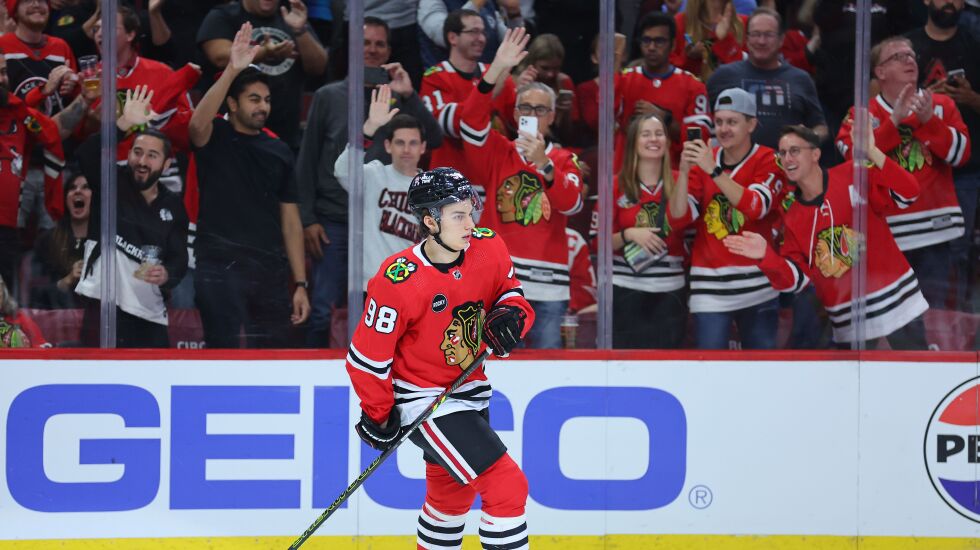
DENVER — Tickets for the Blackhawks’ home opener Saturday against the Golden Knights are understandably expensive. It’s a huge game for many reasons: it’s Connor Bedard’s first regular-season game in Chicago, the opponent is the defending Stanley Cup champions and it’s a Saturday night.
All that adds up to an $84 get-in price and $250 average ticket price on the resale market as of Thursday morning, per the Hawks’ internal data.
The high demand has also led tickets for the Hawks’ second home game Tuesday against the Bruins to steadily increase in value, as fans turn toward it as an alternative to Saturday. That Bruins game had a $47 get-in price and $134 average ticket price as of Thursday morning.
Even looking down the rest of the Hawks’ home schedule, get-in prices are significantly higher than they have been in past years. It’s $51 for Nov. 4 against the Panthers, $36 for Nov. 5 against the Devils, $27 for Nov. 16 against the Lightning, $38 for Nov. 19 against the Sabres, $89 for Nov. 24 against the Maple Leafs (the Black Friday matinee) and so forth.
There’s one very significant reason for that: the Hawks have been diligent about preventing third-party brokers from purchasing tickets.
Why is that the reason? Here’s a quick explanation. Brokers buy thousands of season-ticket plans for most NHL teams, then immediately list those tickets on the resale market. For teams that end up enjoying good seasons and generating high demand, the brokers profit handsomely. For teams that don’t, the brokers dump the tickets for cheap — sometimes in the range of $5.
That’s what has happened with Hawks tickets in recent years. And that has prevented season-ticket members — who might’ve paid, say, $50 per game for their plan — from getting anything close to $50 back when selling tickets for games they can’t attend.
Now, they should be able to. The Hawks audited all ticket sales this summer to identify and refund those purchased by brokers, Hawks business president Jaime Faulkner said. The team forfeited around $5 million in revenue by doing so, but they considered it worthwhile long-term.
This might be bad news for casual fans trying to snag dirt-cheap tickets on StubHub hours before puck drop, but it’s very good news for season-ticket members — and those are the customers the Hawks rightfully care the most about.
“We want to grow the pie in terms of revenue, but we don’t want to do it on the backs of our season-ticket holders,” Faulkner said. “And that’s the way the rest of the world works. The closer you get to a [trip], the more an airline ticket costs you. It’s just the law of supply and demand. We’re not doing something unique here. We just weren’t doing it and now we are.”
Another welcome side-effect of cutting out brokers is that doing so eliminates swaths of empty seats around the United Center that were originally purchased by brokers but went unsold on the resale market.
Actual fans are much more likely to use the tickets they buy, which helps align announced attendance figures — which actually reflect the number of tickets distributed, per NHL policy — with the number of people actually in attendance.
Physical tickets now available
One notable attribute about all the tickets discussed above is that they’re universally mobile-only. That’s how ticketing at the United Center — and at every major arena around the country — works in 2023.
But the Hawks have heard repeatedly from fans over the past several years that they miss having physical, printed tickets to keep as memorabilia. That kind of feedback poured in especially after memorable nights like Patrick Kane’s 1,000th game, Jonathan Toews’ final game and Marian Hossa’s jersey retirement.
This season, those physical, printed tickets will finally be available again. After any game they attended, fans can order physical tickets for $10 each. On the front, the ticket looks like an old-school ticket with matchup and seat info, but on the back, there will be stats from the game.
“We want to make sure these tickets are [not only] commemorative but also collectible,” Faulkner said. “It has value because there’s only one of them for that seat.”
Along with this comes a new program called “Blackhawks Classics,” the Hawks announced Thursday. For games during which something special happens — such as Bedard’s first goal at the United Center, for example — and the Hawks dub the game a classic, all physical tickets ordered will have a QR code on the back (next to the stats). Scanning that code on a phone will load the highlights or content related to what happened.
Corporate partnerships tightened
There are many aspects of the Hawks’ business operations that don’t affect the on-ice product whatsoever and are thus rarely paid any attention by fans. Corporate sponsorships and partnerships certainly fall in that category.
But the organization’s approach to corporate sponsorships has changed so significantly since the pandemic that it is, for once, somewhat relevant and interesting.
“We’ve taken the approach of ‘Bigger, better, fewer,’” Faulkner said. “What are the top brands that align with our brand? Can we make them better? Can they make us better? That’s the goal. And then [we’re] really limiting and focusing on the top brands.”
The end result is the Hawks entered this season with 84 corporate partners. That’s less than half of the 190 partners they had in 2020.
The revenue the Hawks draw from those partnerships, however, has increased. And they’re also now able to work more closely with each one.







